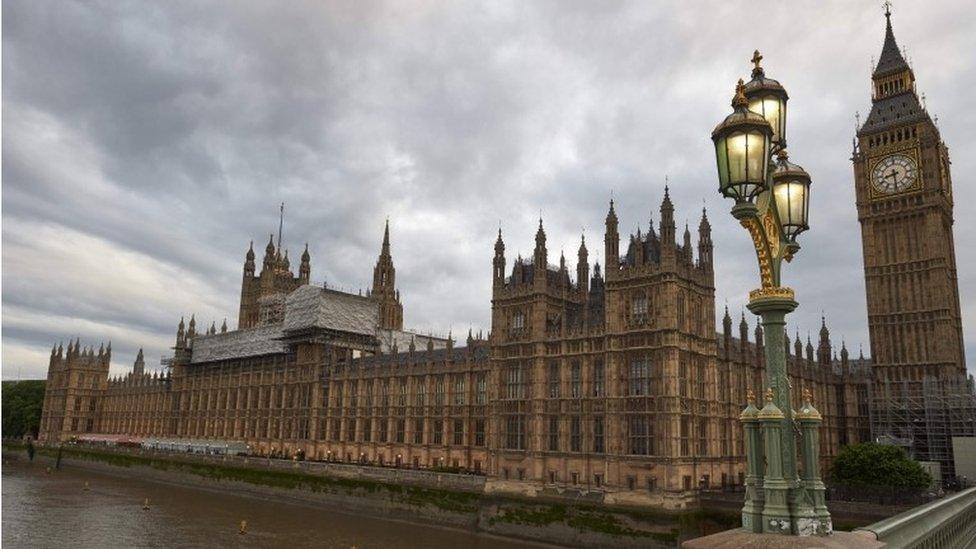Election results 2017: DUP and Sinn Féin celebrate election gains
- Published
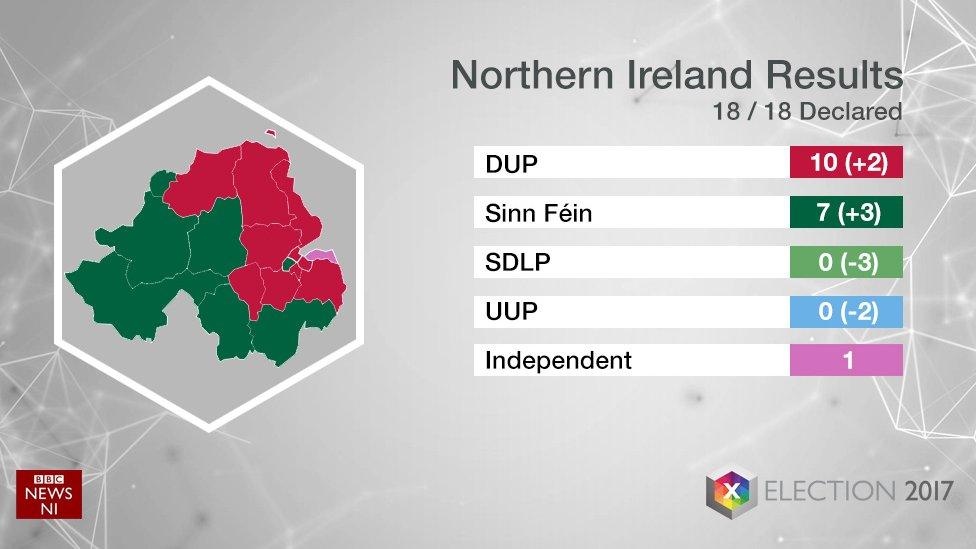
The SDLP and the UUP have lost all their Westminster MPs after a night of big gains for the DUP and Sinn Féin in the general election.
The DUP won 10 seats, Sinn Féin won seven and independent candidate Lady Sylvia Hermon retained North Down.
The Conservatives were the largest party, without an overall majority.
The DUP leader, Arlene Foster, said her party was opening talks with the Conservatives and have already been speaking to Theresa May.
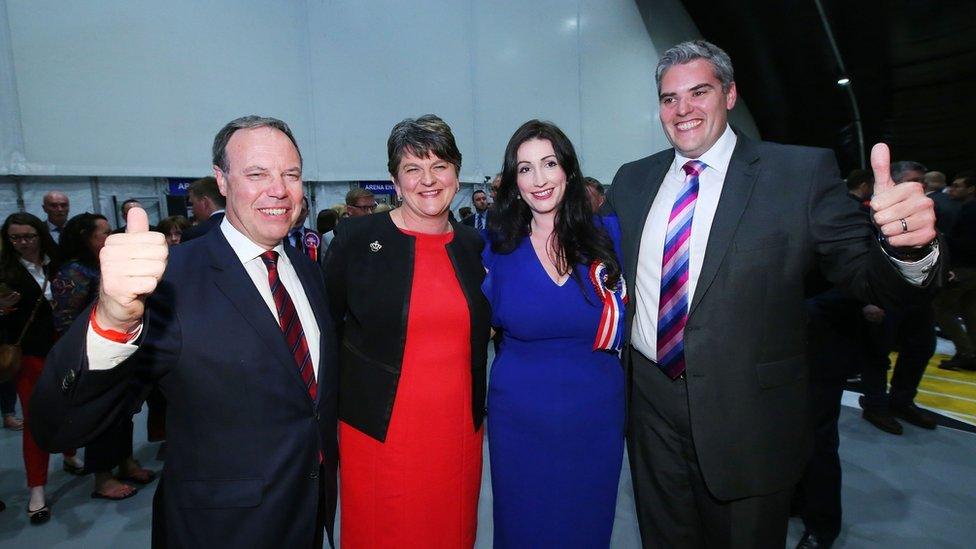
The DUP's deputy leader Nigel Dodds, leader Arlene Foster, and MPs Emma Little-Pengelly, Gavin Robinson celebrated the party's success
Sinn Féin MPs do not take their seats in the House of Commons, and the party's northern leader Michelle O'Neill has confirmed the policy of abstentionism will continue.
Earlier, DUP leader Arlene Foster said it was too early to say if her party would play any role in supporting a Conservative government, but she admitted that Prime Minister Theresa May now faces a challenge to her leadership.
"It's too soon to say what we're going to do yet, I think we need to see the final make up of Parliament and then we'll reflect on that," Mrs Foster said.
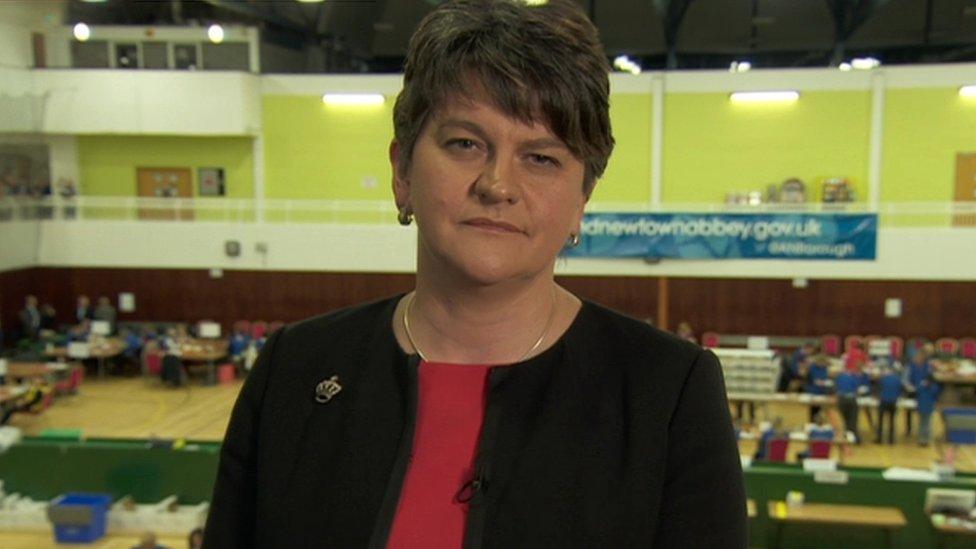
DUP leader Arlene Foster said she did not know if Theresa May would be able to hold on to her job
Asked if she thought Mrs May would be able to stay in her job, the DUP leader replied: "I don't know", adding: "I think it will be difficult for her to survive".
The DUP increased its vote share by just over 10% while Sinn Féin's share of the vote went up by almost 5%.
'Wake-up call'
Mrs Foster added that the election count had been a "really good night, not just for the DUP but for unionism in general".
She said the results of the Northern Ireland Assembly election in March - which saw a surge in the Sinn Féin vote - had been a "wake-up call" for unionism and its supporters had responded by increasing the DUP's mandate.
Mrs Foster told BBC Radio Ulster that talks to restore Northern Ireland's devolved government could be delayed as a result of the hung parliament.
However, Mrs O'Neill insisted Sinn Féin is ready to resume Stormont negotiations immediately.
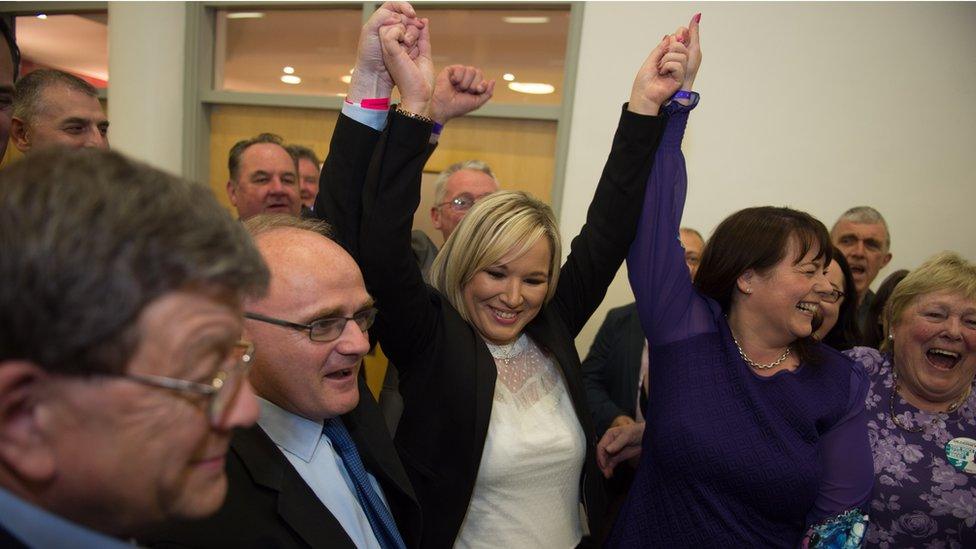
Sinn Féin's Michelle O'Neill celebrated the victories of Michelle Gildernew and Barry McElduff
"We'll be meeting all the other parties from Monday," she said.
"We're ready to talk about the issues because what the public have endorsed is, they want an executive to work, they want the parties to work together.
"But they do want - and they have very much endorsed - equality, respect and integrity at the heart of government and that's what I'll be working for every day."
Sinn Féin president Gerry Adams said there was a need for "calm reflection of how we chart a way forward".
"Clearly nationalism in the north has turned its back on Westminster," he said.
"For us the big focus is to continue to work in all of the different ways that we can to get the special designated status for the north within the European Union."
It has been a painful election for the SDLP.
Three of its former leaders - Mark Durkan, Margaret Ritchie and Alasdair McDonnell - lost their seats in Foyle, South Down and Belfast South.
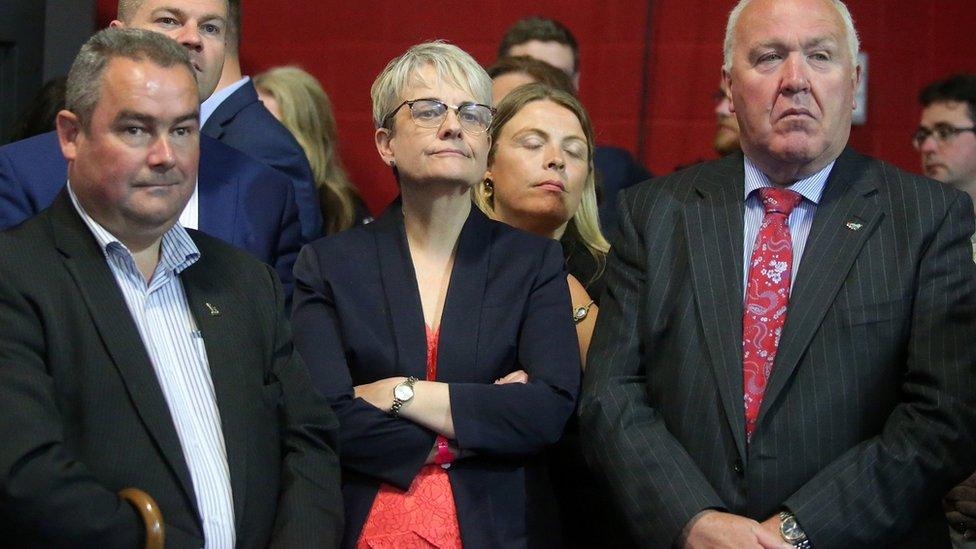
Former SDLP leader Margaret Ritchie lost her seat in South Down
SDLP leader Colum Eastwood admitted it was a "very difficult night" for the party and paid tribute to its three former MPs.
"Those of us who are democratic nationalists have to reflect on the fact that, for the first time for decades, there won't be an Irish nationalist voice in Westminster - I think that's a very sad thing."
Mr Eastwood said the SDLP needs to "find a way of finding our voice again".
He added that the dominance of the DUP and Sinn Féin had produced an "arm wrestle that nobody can win".
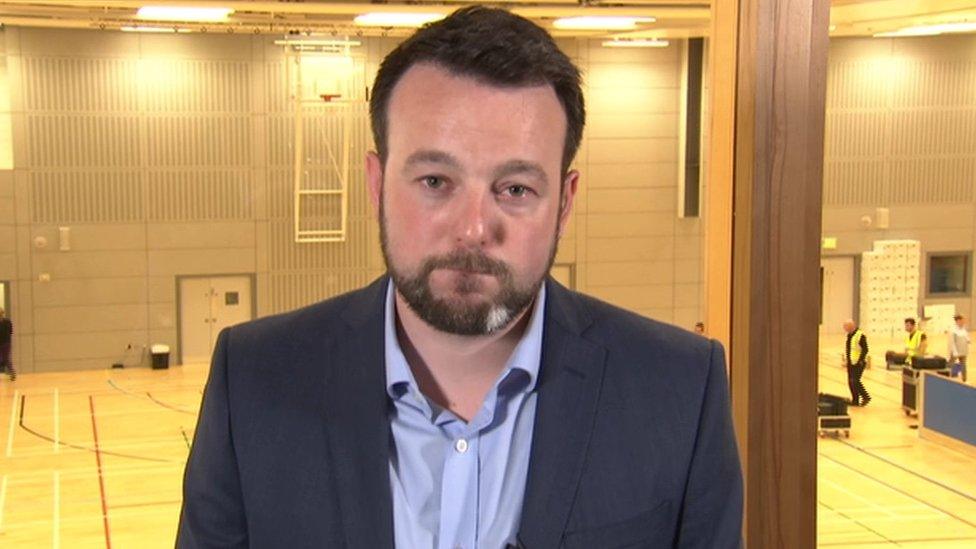
Colum Eastwood has led the SDLP since 2015
The Ulster Unionist Party went into the election with two seats and lost both.
Danny Kinahan lost out in South Antrim to the DUP's Paul Girvan while in Fermanagh and South Tyrone, Tom Elliott was beaten by Sinn Féin's Michelle Gildernew.
'More polarised'
Mr Elliott reflected on a significant shift away from the centre ground among both unionist and nationalist voters in Northern Ireland.
"It does appear that the people have voted to go in a more polarised direction, with the two main parties, and that's democracy.
"That's what is in people's minds at the moment and I'm assuming there is a reaction there to what happened in the assembly election just a couple of months ago."
Unionists lost their majority at the Northern Ireland Assembly election for the first time in March, and the DUP's lead over Sinn Féin was cut from 10 assembly seats to one.
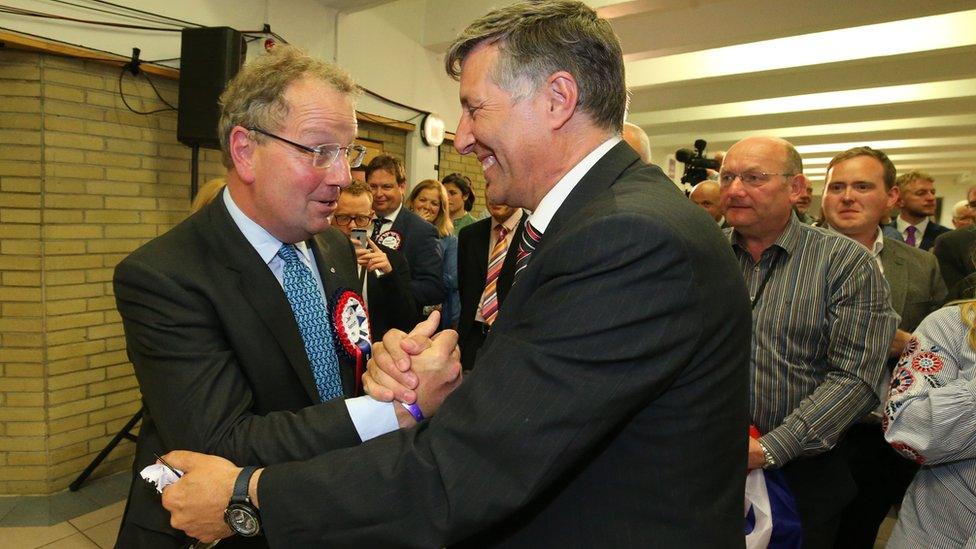
UUP's Danny Kinahan congratulates the DUP's Paul Girvan
Alliance leader Naomi Long had been the bookies' favourite to win the East Belfast seat back from the DUP, but on the night she was beaten by almost 8,500 votes.
She also agreed voting patterns had become more polarised.
"We didn't go wrong but the reality is there was a huge push in terms of unionist turnout," Mrs Long said.
"I think what we saw was the effect of Sinn Féin doing very well in the last assembly election and a unionist reaction against that, and so we've suffered in that respect."
The most dramatic scenes of the night came in Foyle where the SDLP lost the seat it has held since the constituency was formed in 1983.
Sinn Féin's Elisha McCallion was declared the winner by 169 votes after a recount.
Mr Durkan said the loss "hurt" and apologised to former SDLP leader John Hume, who was the constituency's MP from 1983 to 2005.
Elsewhere, Ms Ritchie lost her seat in South Down to Sinn Féin's Chris Hazzard while the DUP's Emma Little-Pengelly defeated Dr McDonnell.
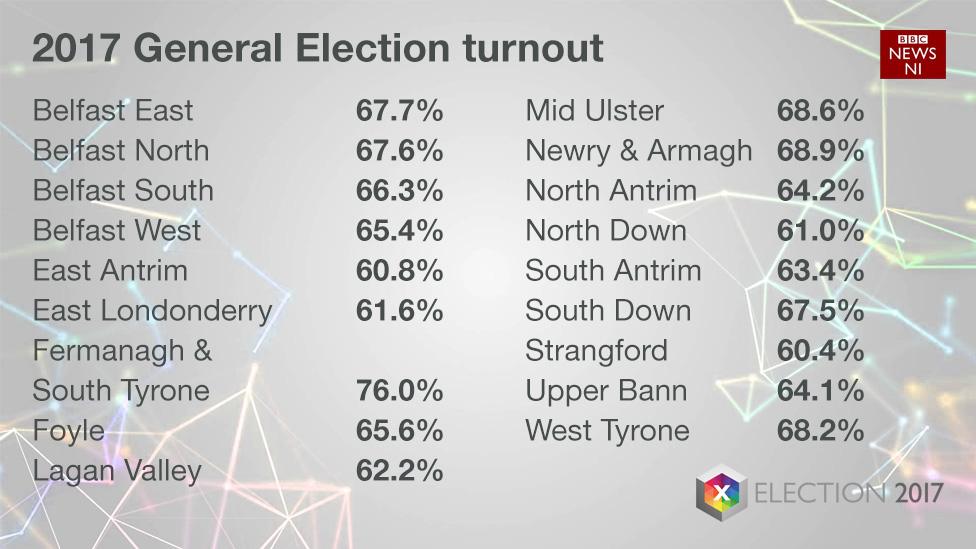
Turnout figures have been confirmed across Northern Ireland's 18 constituencies
The DUP's Nigel Dodds, Gavin Robinson, Sammy Wilson, Gregory Campbell, Jeffrey Donaldson, Ian Paisley, Jim Shannon and David Simpson retained their seats.
Paul Maskey, Francie Molloy and Mickey Brady were returned for Sinn Féin who also had Barry McElduff elected in West Tyrone.
A total of 109 candidates stood across Northern Ireland and 1.2m voters were eligible to vote.
Counting took place overnight at seven different centres and the first results in Northern Ireland came in at about 01:00 BST on Friday.
All 18 Northern Ireland seats were declared by 04:10 BST.
- Published6 June 2017
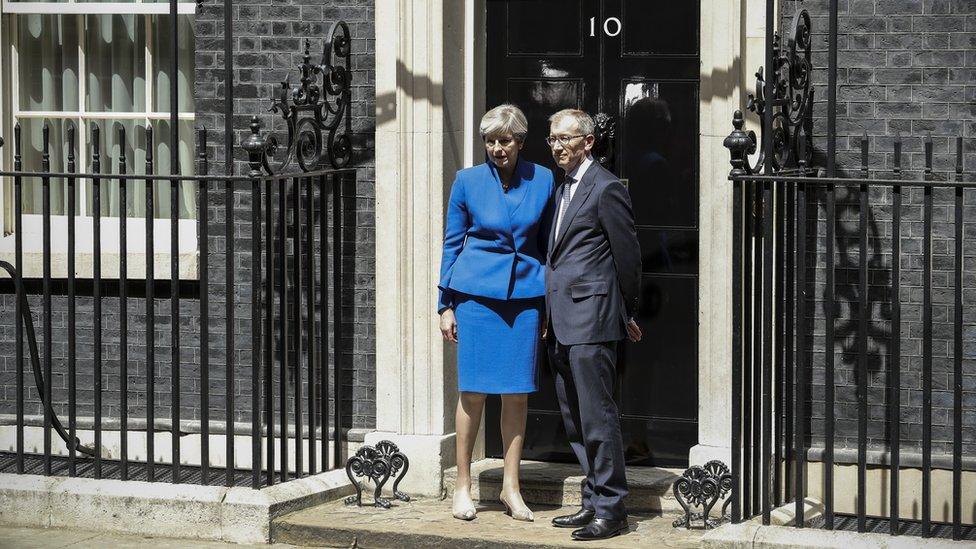
- Published7 June 2017

- Published9 June 2017
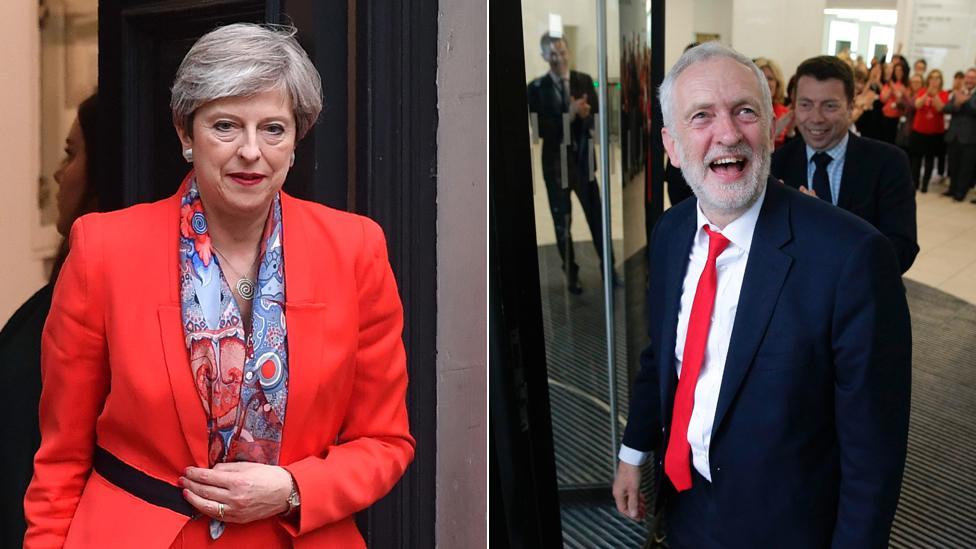
- Published9 June 2017
